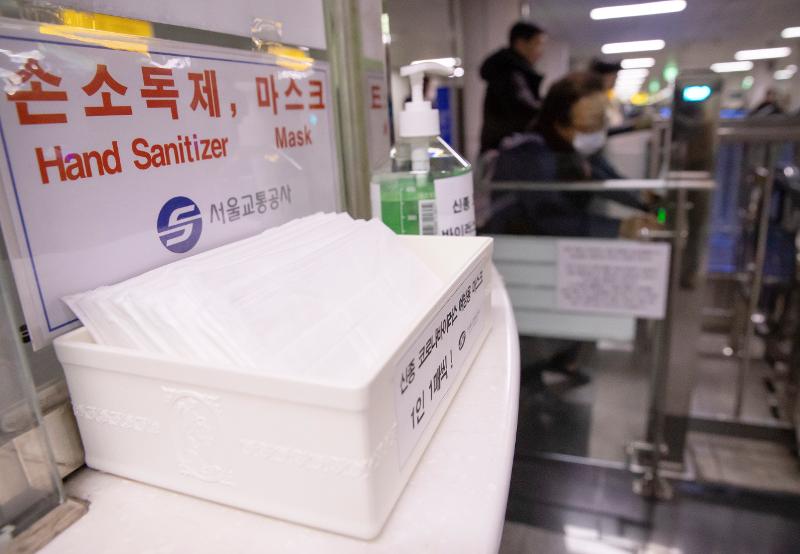
The Korea Centers for Disease Control and Prevention is urging the public to take preventative measures against the spread of the novel coronavirus, namely washing their hands thoroughly when in public places and covering their mouths with their sleeves when coughing. The photo shows a stand with hand sanitizer and masks on Jan. 28 at City Hall Station. (Yonhap News)
The spread of the novel coronavirus around the world has led to the rapid proliferation of misinformation on the virus through social media.
To prevent fearmongering based on false data, the Korea Centers for Disease Control and Prevention has prepared the following Q&A on the facts and fiction about the outbreak:
1. You can get infected by visiting a place where a coronavirus patient was. – False
Most viruses in the air die within two days. Health centers where coronavirus patients visit undergo thorough sanitization and are thus safe. In addition, it is essential for people to faithfully take preventative measures such as thorough hand washing after visiting public places.
2. People coming to Korea from places other than Wuhan, China, need no checks for the coronavirus. – False
The Central Disaster Management Headquarters under the Ministry of Interior and Safety said the number of facilities to detect the coronavirus and that of people to be tested have increased as of Feb. 7.
Those who must undergo testing for the coronavirus are 1) those experiencing fever and respiratory problems (e.g., cough or sore throat) within 14 days after visiting China; 2) people coming down with fever or respiratory problems within 14 days after being in direct contact with a coronavirus patient when the latter showed symptoms; and 3) those suspected by doctors to having the coronavirus. All three categories apply to both domestic and foreign nationals.
Those whom doctors believe could have the coronavirus are people coming down with pneumonia for unknown reasons or fever or respiratory problems after visiting countries hit hard by the coronavirus such as Thailand and Singapore.
3. The fatality rate of the coronavirus is 15%. – Unconfirmed
No concrete statistics have yet pointed to a confirmed fatality rate.
4. You can get infected by eating kimchi made in China. – False
The process of transporting and importing kimchi takes a while, so the probability of a virus surviving this process is extremely low. The coronavirus is spread by saliva particles emitted when an afflicted patient coughs, sneezes or speaks. Infection is also possible through direct contact with the mucous membrane.
5. Chinese authorities say garlic can prevent infection with the coronavirus. – False
Garlic and kimchi are good for health but no scientific evidence has shown that either has a direct impact on preventing coronavirus infection.
6. Rubbing Antiphlamine (Korean anti-inflammatory ointment) on the nose, mouth or hands can protect one against the coronavirus. – False
Please do not believe false claims that the coronavirus is averse to the smell of Antiphlamine and thus cannot enter a person's respiratory system if the ointment is applied on the body. Antiphlamine is an anti-inflammatory painkiller with no relation to the prevention of the coronavirus, which infects the respiratory system.
jesimin@korea.kr